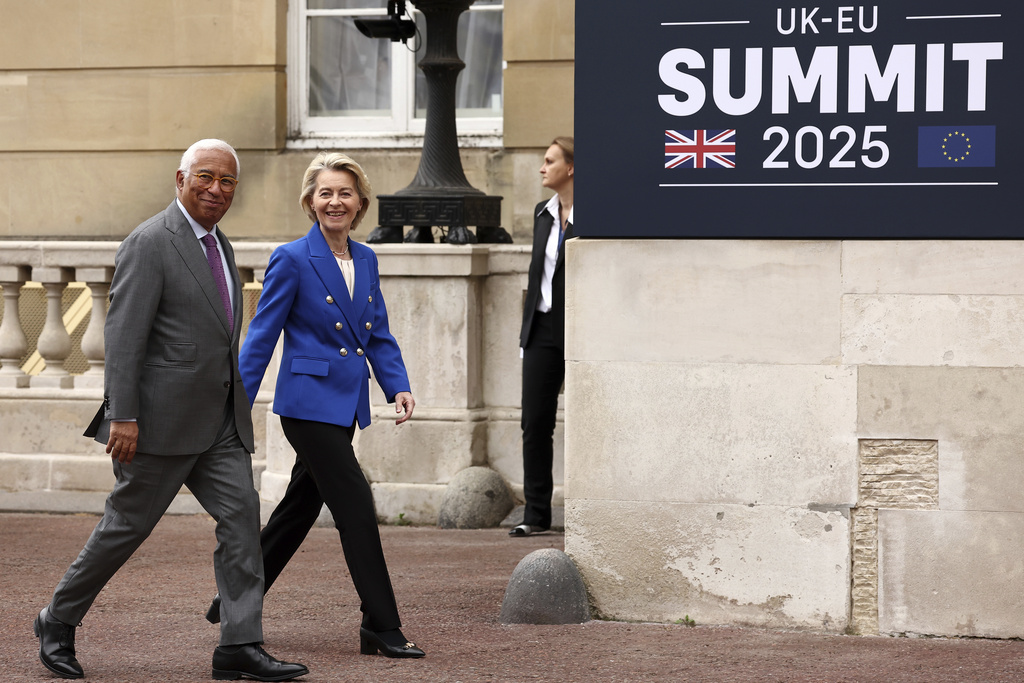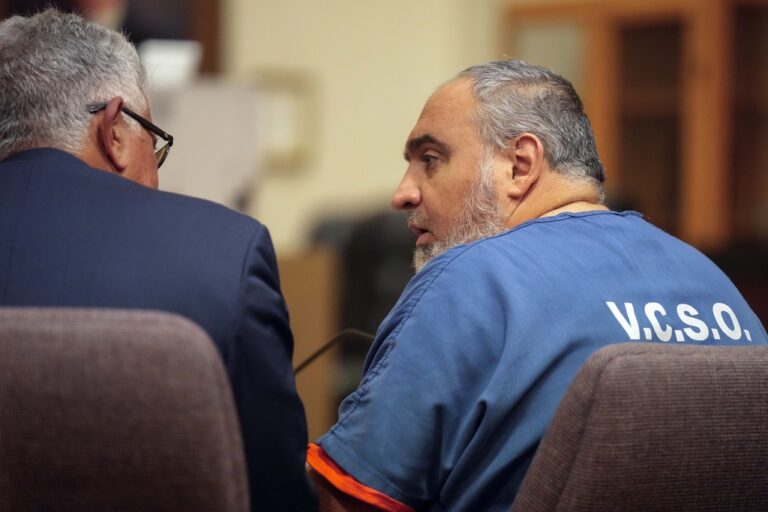Britain and the European Union hailed a new chapter in their relationship Monday after they sealed new agreements on defense cooperation and easing trade flows at their first formal summit since Brexit.
Prime Minister Keir Starmer, who met European Commission President Ursula von der Leyen and other senior EU officials in London for talks, said the deals will slash red tape, grow the British economy and reset relations with the 27-nation trade bloc since the U.K. left the EU in 2020.
“Britain is back on the world stage,” Starmer said. “This deal is a win-win.”
Von der Leyen called the talks a “historic moment” that benefits both sides. More broadly, she said it sends a message at a time of global upheaval that the U.K. and EU are “natural partners standing side-by-side on the global stage.”
Britain’s opposition parties slammed the deals as backtracking on Brexit. “We’re becoming a rule-taker from Brussels once again,” Conservative Party leader Kemi Badenoch said.
Under the deals, a new U.K.-EU defense and security partnership will allow the U.K. to access a EU defense loan program worth 150 billion euros ($170 billion.)
Other agreements include removing some checks on animal and plant products to ease food trade across borders, and a 12-year extension of an agreement allowing EU fishing vessels in U.K. waters.
While the EU is the U.K.’s largest trading partner, the U.K. has been hit with a 21% drop in exports since Brexit because of more onerous border checks, laborious paperwork and other non-tariff barriers.
Post-Brexit visa restrictions have also hobbled the cross-border activities of professionals such as bankers or lawyers, as well as cultural exchanges, including touring bands and school trips.
Resetting relations
Since becoming prime minister in July, Starmer has sought to reset relations with the EU, following years of tensions in the wake of the U.K.’s 2016 Brexit referendum.
Post-Brexit relations have been governed by a trade agreement negotiated by then-Prime Minister Boris Johnson. Starmer thinks that can be improved in a way that boosts trade and bolsters security.
Starmer hailed Monday’s agreements — the third package of trade deals struck by his government in as many weeks following accords with the U.S. and India — as “good for jobs, good for bills and good for our borders.”
Burgers, fishing and youth mobility
The defense pact will allow Britain’s defense industry to access cheap loans from a n ew EU loan program to buy military equipment, in part to help Ukraine defend itself.
In trade, officials say they will reduce routine border checks and costs on some food imports and exports to make it easier for goods to flow freely. The changes will mean the U.K. can sell products like British burgers and sausages to the EU again, officials said.
“We know we’ve had lorries waiting for 16 hours, fresh food in the back not able to be exported, because frankly it’s just going off, red tape, all the certifications that are required, we absolutely want to reduce that,” Cabinet Office minister Thomas-Symonds, who led the negotiations, told the BBC.
In fisheries, the deal means European fishing boats will have access to U.K. waters until 2038. While economically minor, fishing has long been a sticking point and symbolically important issue for the U.K. and EU member states such as France. Disputes over the issue nearly derailed a Brexit deal back in 2020.
The talks also included a youth mobility plan that’s expected to allow young Britons and Europeans to live and work temporarily in each other’s territory, though no details were provided.
That remains a politically touchy issue in the U.K., seen by some Brexiteers as inching back toward free movement. The U.K. has similar youth mobility arrangements with countries including Australia and Canada.
Starmer has stressed that the U.K. won’t rejoin the EU’s frictionless single market and customs union, nor agree to the free movement of people between the U.K. and the EU.
Opposition objects to a ‘surrender’
Some of the trade-offs may prove difficult for Starmer, who faces growing challenges from the pro-Brexit and anti-immigration Reform U.K. party and accusations of “betraying” Brexit.
Reform, which recently won big in local elections, and the Conservatives have called the deal a “surrender” to the EU.
U.S. President Donald Trump, who has backed Brexit, could also be a potential headache for Starmer.
“The reset could still be blown off course by disagreements over how to consolidate existing areas of cooperation like fisheries and/or external factors, such as a negative reaction from the U.S. to the U.K. seeking closer ties with the EU,” said Jannike Wachowiak, research associate at the UK in a Changing Europe think tank.
(AP)











